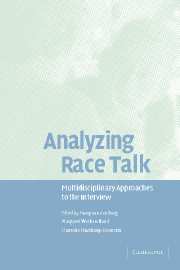Book contents
- Frontmatter
- Contents
- List of contributors
- Preface
- Acknowledgments
- Transcriptions symbols
- Introduction
- 1 Racism and the analysis of cultural resources in interviews
- 2 Analyzing racial discourse: the discursive psychology of mind–world relationships
- 3 Constructivist processes in discourse: a cognitive linguistics perspective
- 4 Institutional, professional, and lifeworld frames in interview talk
- 5 The uses of absurdity
- 6 Multiple voices in talking race: Pakeha reported speech in the discursive construction of the racial other
- 7 Contradictions in interview discourse
- 8 Racism, happiness, and ideology
- 9 The frame analysis of research interviews: social categorization and footing in interview discourse
- 10 Affiliation and detachment in interviewer answer receipts
- 11 Interviewer laughter as an unspecified request for clarification
- 12 Perspectives and frameworks in interviewers' queries
- Appendix: Interview transcripts
- Index
2 - Analyzing racial discourse: the discursive psychology of mind–world relationships
Published online by Cambridge University Press: 22 September 2009
- Frontmatter
- Contents
- List of contributors
- Preface
- Acknowledgments
- Transcriptions symbols
- Introduction
- 1 Racism and the analysis of cultural resources in interviews
- 2 Analyzing racial discourse: the discursive psychology of mind–world relationships
- 3 Constructivist processes in discourse: a cognitive linguistics perspective
- 4 Institutional, professional, and lifeworld frames in interview talk
- 5 The uses of absurdity
- 6 Multiple voices in talking race: Pakeha reported speech in the discursive construction of the racial other
- 7 Contradictions in interview discourse
- 8 Racism, happiness, and ideology
- 9 The frame analysis of research interviews: social categorization and footing in interview discourse
- 10 Affiliation and detachment in interviewer answer receipts
- 11 Interviewer laughter as an unspecified request for clarification
- 12 Perspectives and frameworks in interviewers' queries
- Appendix: Interview transcripts
- Index
Summary
Introductory remarks
The aim of this chapter is to illustrate discursive psychology and its methodology by examining some extracts from the interview materials. “Discursive psychology” studies the relationships between mind and world, as psychology generally does, but as a discourse topic, that is, as a participants' concern, a matter of talk's business, talk's categories, talk's rhetoric, and talk's current interactional concerns. This contrasts with most other psychological approaches, in which talk is treated as the expression and communication of thoughts and communicative intentions. Among various inspirational sources for the discursive approach taken here, I would list Harvey Sacks' (1992) lectures on conversation, Melvyn Pollner (1987) on reality disjunctures, Dorothy Smith (1990) on factual discourse, Jeff Coulter (1990) on language and mind, Michael Billig (1987) on rhetoric, and Potter and Wetherell (1987) on the relevance of discourse studies to social psychology (see also Harré and Gillett 1994; Smith, Harré, and Langenhove 1995). Examples of my own work include various books and articles (Edwards 1991, 1995, 1997; Edwards and Potter 1992, 1993) that investigate how common-sense conceptions of mind and world are deployed in everyday talk and text.
One basic theme in all of this work is the way that mind and world are generally played against each other, in a conceptual and rhetorical trade-off between the world “out there” and the mental world “within,” including whatever characteristics or “dispositions” may be claimed by, or assigned to, people.
Information
- Type
- Chapter
- Information
- Analyzing Race TalkMultidisciplinary Perspectives on the Research Interview, pp. 31 - 48Publisher: Cambridge University PressPrint publication year: 2004
Accessibility standard: Unknown
Why this information is here
This section outlines the accessibility features of this content - including support for screen readers, full keyboard navigation and high-contrast display options. This may not be relevant for you.Accessibility Information
- 16
- Cited by
